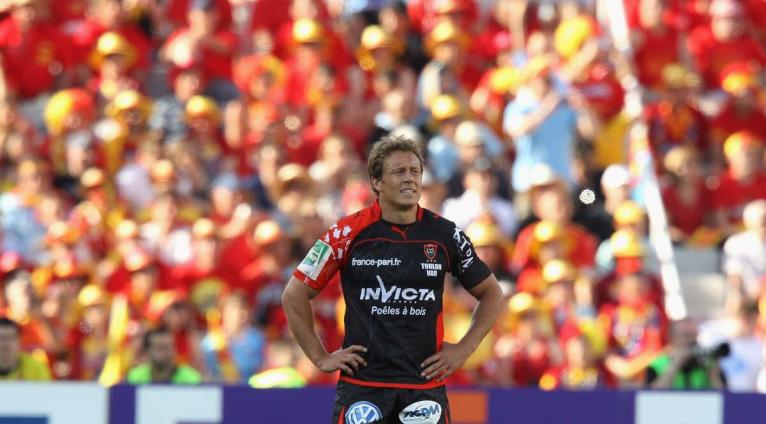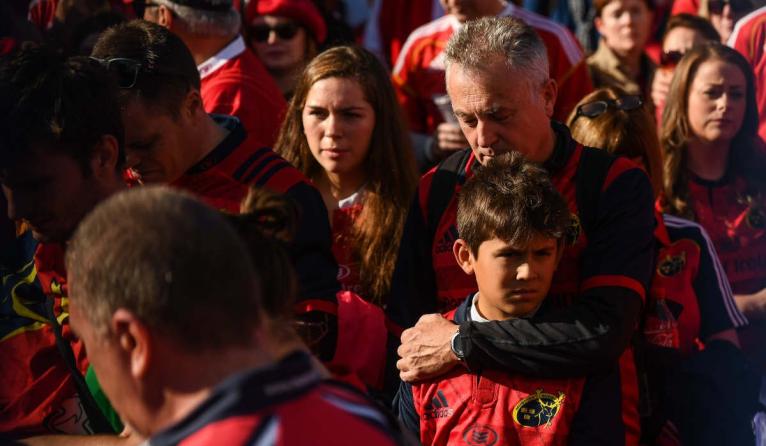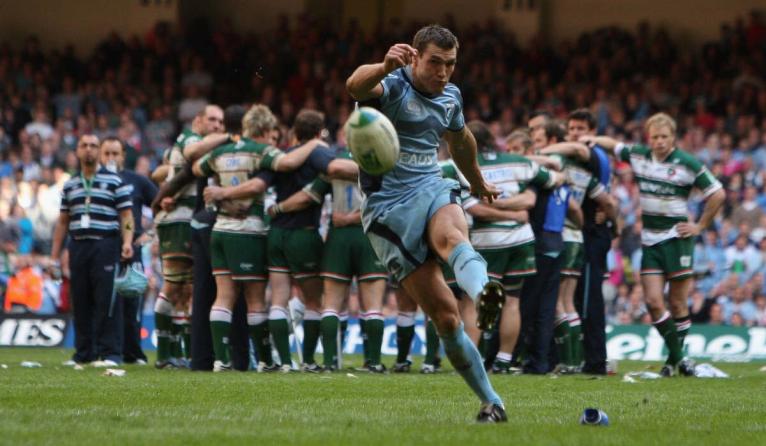Love letters are not my forte. English, male, emotionally constipated; do I need to draw you a diagram? I suspect not. I did once write a tear-stained billet-doux to George Best when he got sent off at Chelsea but, in fairness, I was only seven. The Valentine card to Halle Berry when I was 47 was, I admit, less excusable but no less heartfelt. No matter; neither replied.
But offered a choice this very weekend between dinner a deux at Le Cafe de Paris in Monaco with Giacinta ‘Jinx’ Johnson or a ticket in the arse-end of one and nine-pennies as Leicester grapple with Leinster, then – apologies to Halle – I’d be heading up the road from Welford like a rat up a drainpipe. And, let’s face it, when an evening of Ellis Genge and Tadhg Furlong rubbing ears beats sharing a moonlit verandah with La Berry and a ‘Filet de Maigre Parfume? au Ras-el-Hanout Fenouil et Riz Rouge de Camargue’, you know you’ve an incurable case of mal de coeur. The rugby earth has not anything to show more fair.
Love is life’s great unfathomable and absurd adventure; so, too, the closing paragraphs of the Heineken Cup. How exactly did Bath withstand Brive in a headless denouement to the 1998 final in Bordeaux? How did Wasps outlast Munster in the mayhem of a Lansdowne Road semi final in 2004? And when has rugby ever delivered a more febrile quarter final than Perpignan against Toulon in front of 55,000 crazed Catalans in Barcelona in 2011? That was the weekend I was assigned to cover Northampton against Ulster in Milton Keynes. No offence to either side but I have neither forgotten nor forgiven.

But the Heineken Cup – certainly in the knockout stages – is where indelible memories are made and with a frequency that almost defies arithmetic. How long have you got? You could sit down to write a list of the most unforgettable moments in the final furlongs of Europe and fill four pages just talking about Munster. It is the gift that keeps on giving, unless, of course, you’re Clermont Auvergne.
And what, precisely, is this magic made of? Again, take your pick; the naked anticipation of watching two teams who may never have met or, conversely, the shared history of two sides – Munster and Toulouse spring readily to mind – who’re the most intimate of strangers. There’s also the almost overwhelming weight of the chips on the table together with the delicious knowledge that – like the back nine on Sunday at the Masters – what you’re watching is as much about brass balls as golf balls.
‘Le Stade Marcel Michelin’ is like being buried alive in a raucous banana and Toulon (or Marseilles or Nice) when the Heineken Cup is in town is a riot of exquisite idiocy.
But it’s the sheer sense of occasion that makes you dizzy and – invariably in the last eight – that means Ireland and France. Facing Thomond Park with its fur up is to understand how Canute lost his marbles trying to hold back the tide; pitch-side at ‘Le Stade Marcel Michelin’ is like being buried alive in a raucous banana and Toulon (or Marseilles or Nice) when the Heineken Cup is in town is a riot of exquisite idiocy. I swear, watching Jonny English and ‘Les Toulonnais’ bringing the pot into port in 2013 in a flotilla of boats amid a wild jubilation of fans, flares and flags – 60,000 was the estimate – was more electric than my first, fumbled kiss. Susan, what can I say? I’m sorry.
It’s the cacophonous colour of the Heineken Cup; the union of team and terrace, the assault on the senses that gives this competition its almost visceral appeal. Back in the day, Biarritz shifted a bundle of their knockout games to San Sebastian in which the rugby – frankly – came a poor second to a vivid and joyous festival of Basque nationhood, the one, glorious exception being the Ospreys scaring the pants off them in a 2010 quarter final. Twelve years on, and I’ve still no idea how they lost that game.

But this impassioned sense of identity is, invariably, a camaraderie of shared enthusiasm: like not only recognises like but shows a healthy, heartfelt respect for it too. Thus do we get Jack Nowell watching Exeter in Limerick wearing a large beer and a Munster shirt; or a cluster of Leicester supporters in ‘La Place de Jaude’ – speaking no French – trying to teach a clutch of chortling Clermont fans – speaking no English – how to pronounce ‘Abendenon’; or, magically, the moving and heartfelt response of Racing ’92 to the untimely passing of the wonderful Axel Foley, opening their homes to Munster fans when the postponed match was replayed in Paris four months later. As narrow as the tribalism can get, the width is never forgotten.
There is something epic about the last eight of the Heineken Cup – a quest, a crusade, a Holy Grail – although for some, certainly in France, that’s meant ‘Paradise Lost’
Above all, though, there is something epic about the last eight of the Heineken Cup – a quest, a crusade, a Holy Grail – although for some, certainly in France, that’s meant ‘Paradise Lost’; Stade Francais, Biarritz Olympique, Clermont Auvergne and, most recently, Racing ’92 have all found their infatuation with the Heineken Cup tantalisingly unrequited in the knock- out stages and if you judge the worth of a competition by the desolation of the losers, look no further. Affairs of the heart can be brutally unforgiving.
True, there’ve been times when the tournament’s administrators have, seemingly, looked hell-bent on turning wine into water; other occasions, too, when the closing chapters of the Heineken Cup have fallen clean down the rabbit hole. Blood capsules – and almost Johnsonian levels of dishonesty – in a quarter final; a preposterous, merciless penalty shoot out in a semi final and Guy Noves being marched out of Murrayfield by the Lothian and Borders Police as Toulouse were preparing to receive their just desserts after the 2005 final. Had Magritte painted the tableau – ‘Le Grand Malentendu’ – it could scarcely have looked any less surreal.

And, from a personal – and, I confess, somewhat petty – perspective, the rear end of the Heineken Cup is an incontrovertible contradiction to the dictum that to travel is better than to arrive. There is little in life that prepares you for the ‘Air France’ check-in desk at Orly airport or the ‘Ryanair’ flight to Dublin sat in the middle of Dierdre’s hen party or the moonlight flit from Llanelli to Leicester when your co-pilot – my lips are sealed – refuses to wear his seat- belt and the Japanese hire car spends the entire 188 miles chiming its furious disapproval. I can laugh now but, in truth, it’s still an effort. Thus, for a good reason, is comedy described as tragedy plus time.
Hey, good luck picking the winner in Marseilles. But, rest assured, what’ll separate the windscreens from the flies, inevitably, will be raw rugby intelligence.
As for this year’s knock-out stages, well, you could make a persuasive – make that a plausible – case for just about any of the last eight winning the thing. However, in the top half of the draw, Racing ’92 have not just a home quarter but, potentially, a home semi (against either La Rochelle or Montpellier) and, you’d think, must be odds on for the final; in the bottom half you have Leicester, Leinster, Munster and Toulouse (thirteen titles between them) all in with a meaningful shout, although given the winner of Leicester/Leinster gets the green grass of home in the semis, their – seismic – quarter final becomes even more pivotal.
Hey, good luck picking the winner in Marseilles. But, rest assured, what’ll separate the windscreens from the flies, inevitably, will be raw rugby intelligence. Look at the roll of honour. Stupid teams do not win this competition, which, when you think about it, is yet another reason to adore the last eight of the Heineken Cup. There is nothing like it anywhere in rugby.


brilliant, a great read, thank you